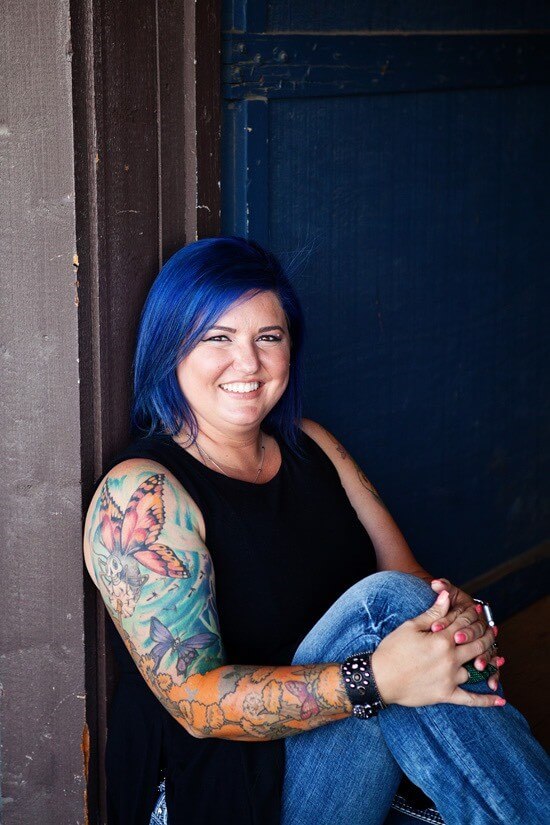As with many Americans, Malia Hicks’ day starts with a cup of coffee at sunrise. However, it’s one that’s hundreds of miles from her family home in Texas, and in Oregon where she’s currently working as a project engineer at a 200-MW wind farm. She oversees the project’s schedule, quality control, and key engineering processes in support of her team. Her motto: “Safety first, quality second, and production will follow.”

Malia Hicks
Although Hicks has no formal education as an engineer, she holds an MBA in marketing and has worked her way through the ropes of renewables for nearly a decade. “I fell into wind energy by happenstance — right time, right place,” she says. Her husband worked in the industry for RES, a global renewable energy company. Hicks began by providing administrative support at RES before moving into several management roles.
“My background is in quality control and when RES integrated quality into the role, I stepped up to the challenge,” she says.
In fact, Hicks has stepped into to several challenging roles at RES. She’s worked as a fleet and equipment contract and compliance manager, an equipment and facility manager, and a quality supervisor before earning her current position as a project engineer. This means her typical day involves any and all procedures that contribute to the safety, quality, and morale at the wind site.
“I work closely with the project manager, site superintendent, and discipline superintendents to ensure that work is being done to IFC specifications and to ensure that if issues arise onsite, we quickly and efficiently gather the clarification or approvals necessary,” says Hicks.
IFC refers to “Issued for Construction,” which are the specification by which wind projects must be built to. For example, all construction drawings undergo multiple review phases and are approved and stamped by an engineer of record, and issued as an IFC.
“My goal is to provide the resources I have control over to my teams to allow them to build it right the first time, every time,” she adds. Hicks brings a unique understanding to the job site because of her experience, where she’s worked with superintendents at a wind site’s office and technicians in the field.
“I have the utmost respect for engineers,” she says. “However, I also fully appreciate the critical role of the support team at the site office. I am so thankful to have started with the basics, and then been granted the opportunity to work my way through multiple positions to where I am today.”
Hicks is a self-proclaimed people person and fast learner, which have both contributed to her success. “I didn’t have experience when I started in wind,” she says. “But I quickly learned the value of, and gained confidence and trust, in my relationship with co-workers and their ability to teach. I also asked a ton of questions, and for demonstrations and hands-on training. I am not shy.”
Her outgoing, personable attitude is particularly important in an industry such as wind power, where sites are typically in remote locations. This means workers may spend days or months away from home until a project is built or repaired, relying on co-workers for support and relations.
“Renewable energy careers are a lifestyle, which often includes life away from home, working near people that you may have never spoken to in any other instance. It also means early mornings, late nights, and dirt – lots and lots of dirt,” says Hicks. “It’s important to work hard but not lose yourself in the job…and for women, this means keeping their femininity, confidence, balance, and such.”
A 2017 U.S. Department of Energy employment report found women make up 32% of the wind workforce, for instance, given a total of 102,000 wind industry jobs. A 2019 U.S. Energy & Employment Report had similar findings in the country’s power sector, stating that females only make up between 23 to 33% of the country’s power sector — whereas females make up 47% of the workforce in the overall economy.
“I have dealt with my fair share of male co-workers who, just because I am a woman, seem to dismiss my comments, presence, or ideas. I’m unlikely to change those folks’ opinions and I am OK with that because they are the minorities at a job site,” shares Hicks. “For every one of them, there are a dozen extremely supportive male co-workers that do not care about my gender. They care that I am dedicated to the same goal and that I am willing to learn.” This is what truly matters.
Hicks has had the good fortune of meeting a couple of mentors along her career path whom she credits with passing on wise advice, including the fact that it takes a team to complete a project. “My one mentor said to do such a good job at whatever task you are assigned to that your team cannot afford to lose you. This has resonated with me throughout my career,” she says. “Whether you are the operator in the crane, or just the person picking up trash, everything has relevance. To know your role is part of a larger goal and to do it humbly and to the best of your ability, is so important.”
Hicks’ also has learned a few things and this is her professional advice: “Love what you do…I know that goal will never change for me. And do not, under any circumstance, ever be afraid to ask a question.”
Filed Under: Construction, News




